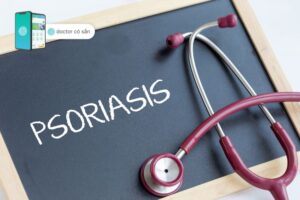Can I get pregnant if I have HIV? Is it possible for a woman to be infected with HIV but not transmit it to her partner? What steps can women take to reduce the risk of passing HIV to their children? These and many other questions are raised by individuals living with or suspected of having HIV who want to conceive. At Docosan, we understand these concerns and are here to provide answers in the article below.
Tóm tắt nội dung
HIV home test to plan a suitable pregnancy
If you are planning to become pregnant and are at high risk of HIV infection, it is important to get tested for HIV proactively to prepare both physically and mentally. Instead of going to a clinic or hospital, you can choose Docosan’s Home HIV/Syphilis Test Kit. This test kit provides a complete set of tools with detailed instructions that you can easily use at home. Within 15 minutes, you will know if you are infected with HIV or not.
Whether the result is positive or negative, you will receive support in connecting with a specialist for advice and answers to any questions you may have. At this time, your doctor can also discuss whether you are pregnant with HIV or not.

Concerns of HIV-infected women in pregnancy
Pregnancy and childbirth are sacred moments for women. Carrying the weight of labor for 9 months and 10 days, experiencing a range of emotions while awaiting the birth of their child, and guiding them towards becoming a good human being. This anxiety follows the mother throughout the journey from learning that she is carrying a baby in her body until adulthood.

For HIV-infected women, this worry is doubled:
- Concerns about transmitting the virus to their baby during pregnancy, delivery, and breastfeeding.
- Sadness upon learning that HIV-infected women are advised not to breastfeed.
- Concerns about HIV treatment during pregnancy and for the baby after birth.
- Fear of their children being judged and discriminated against at school or in activities.
- Anxiety about taking care of themselves during pregnancy and ensuring their baby’s safety, which can predispose them to postpartum depression.
- Concerns about how pregnancy may affect the progress of their HIV treatment.
- Worries that HIV may cause birth defects in their baby, although there have been no reports of this occurring.
Can women with HIV get pregnant?
HIV is a virus that can weaken the human immune system, earning it the title of “disease of the century” due to its dangerous effects. The virus is mainly transmitted through unprotected sex (when condoms are not used), blood transmission (by sharing needles or personal items that may cause bleeding with an infected person), and from mother to child.
Many people wonder if women with HIV can get pregnant. According to several research papers, HIV-infected women who are on treatment and have stable undetectable viral loads are less likely to pass the virus on to their babies during pregnancy and childbirth. In fact, there is an estimated 1 in 1000 chance of transmitting HIV to a child when a woman is on antiretroviral therapy and has a low viral load.

Studies have shown that HIV-positive women who are on treatment and have a stable viral load below the detection threshold have a low risk of transmitting the virus to their baby during pregnancy and childbirth. However, if they breastfeed for about 12 months, the risk increases to 1-2%.
In conclusion, women with HIV can get pregnant, but it is important to discuss their needs and plans with their doctor to ensure their health and reduce the risk of transmitting the virus to the child during pregnancy, childbirth, and lactation.
Can I get pregnant with HIV and the issues surrounding it?
There are many issues surrounding pregnancy and HIV infection, such as whether only women infected with HIV can get pregnant, whether uninfected men can get pregnant, or whether women who are not infected but have a partner with HIV can get pregnant. Additionally, questions arise regarding suitable pregnancy methods for people with HIV. In this article, we will address all of these questions to provide clarity and understanding.
Both women and men are infected with HIV
Pregnancy and childbirth are significant decisions in a person’s life. However, for both men and women living with HIV, it is an even more significant decision because of the increased risk of transmitting the virus to their children. Planning to have children and start a family requires careful consideration.
If you are in this situation, seek professional advice from your doctor or HIV specialist, as well as an obstetrician and family planning specialist. Additionally, it is important to research and educate yourself to ensure the utmost safety.
HIV-positive women and HIV-negative men
In case an HIV-positive woman and an HIV- negative man want to get pregnant, the two of you can choose the method of artificial insemination. This will limit the infection for male friends when having unprotected sex. You can consult an obstetrician-gynecologist for their support.

To increase the likelihood of successful IVF pregnancy, it is advisable to plan it during the most fertile phase of your menstrual cycle. Additionally, you can research fertility by referring to books, websites, or consulting with a healthcare professional such as an HIV specialist, a sexual health expert, or a fertility specialist.










